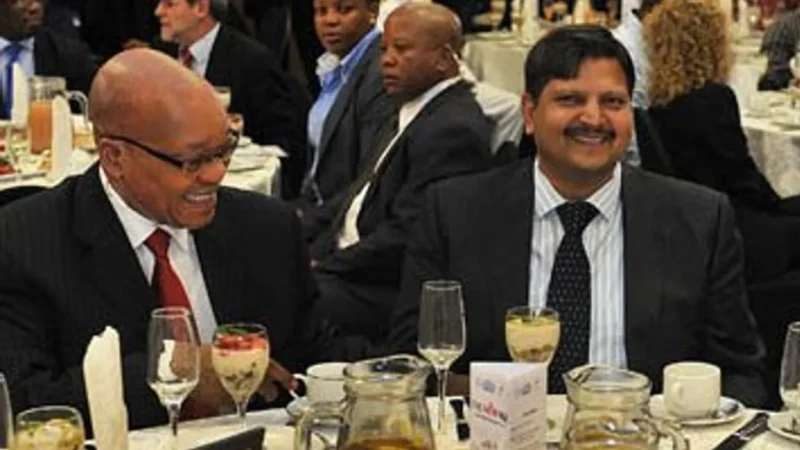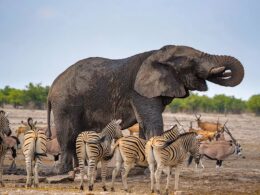The three Gupta brothers accused of corruption links to South Africa’s Jacob Zuma, who resigned as president on Wednesday, had modest beginnings in India. But the world they set out to capture has turned in on them.
On a sunny April morning in 2013, an Airbus A330-2 chartered from an Indian commercial airline arrived at the high-security Waterkloof Air Base in the South African capital of Pretoria.
As the passengers — many dressed in Indian finery for the start of a four-day wedding ceremony — made their way to SUVs waiting to whisk them to the Sun City luxury resort, a very different scene was unfolding in the dusty, South African farming town of Vrede.
Alerted by the reeking smell of dead animals, veterinarians in Vrede were making their way past the iron gates of a dairy farm linked to South Africa’s infamous Gupta family. Starved of funds and incompetently run, the Estina dairy farm was losing animals, many to malnutrition. It was later revealed that millions of rand in state funds, earmarked for the Vrede dairy project, were being laundered through Dubai to finance the Gupta family wedding extravaganza in Sun City.
It was the beginning of the end for the Gupta family, a decisive turn in an extraordinary saga of money, power, greed and chutzpah that played a part in the downfall of South African President Jacob Zuma.
Back in 2013, it seemed like no allegation against the wealthy, well-connected Guptas would stick. The Indian-born Gupta brothers had one asset that seemingly made them invincible: they had the president, and his family, in their deep pockets. The links between the Zumas and the Guptas were so close that the South African press began calling the family, “the Zuptas”.
But the sight of guests arriving for a wedding extravaganza at a high-security base reserved for heads-of-state and top officials was too public to ignore. By the time allegations emerged that state funds meant for a dairy farm were being routed to finance a Gupta family wedding, South Africa’s robust media and the public protector’s office was on the family’s case.
The Gupta family fortunes were crashing just as rapidly as they’d risen: from modest spice and soapstone powder traders in northern India to elite power circles in Africa’s biggest economy.
On Wednesday, police raided the sprawling Gupta family compound in the upscale Saxonwold neighbourhood of Johannesburg, arresting three people.
The swoop came a day after the country’s ruling ANC party ordered Zuma to resign, a decision the embattled South African president has called “unfair”. Zuma eventually resigned as South Africa’s president late Wednesday, a day before Parliament was due to hold a no-confidence vote against him.
The timing of the police raid on the Gupta residence raised eyebrows across the country, with many wondering if it was purely coincidental, or a sign that the “Zuptas” fortunes were tumbling along with Zuma’s political career.
According to a statement released by the Hawks, the South African police’s elite high-priority crimes unit, the raids were carried out in connection with the Vrede farm investigation.
For many South Africans, the sight of white cars — emblazoned with the Hawks emblem — outside the Gupta’s estate symbolised the fall of a family that had been able to take down finance ministers, sway the country’s energy policies to enrich their holdings, disrupt state negotiations and government bids, as well as wreck a thriving company so the family could snap it up on the cheap.
Three young men go out into the world
The Gupta family saga begins in Saharanpur, a gritty, industrial town in Uttar Pradesh, India, where the patriarch, Shiv Kumar Gupta, was a trader in spices and soapstone powders. The three boys, Ajay, Atul and Rajesh, born in the late ‘60s and early ‘70s, were encouraged to go out into the world.
Ajay, the eldest, went to Russia. Atul was dispatched to South Africa since the father, according to family legend, believed Africa “was the next America”. The youngest, Rajesh [also known as Tony] did business in China.
It was the middle boy who struck it big. Arriving in Johannesburg just after the end of apartheid, Atul found a country opening up to business with none of the red tape and hurdles of his native India. In 1994, he started Sahara Computers, assembling cheap computers from imported parts for a growing market of South Africans emerging from poverty.
His two brothers soon joined him in South Africa, by which time Atul had already established contacts with senior ANC officials, including a close aide to South Africa’s then deputy president, Thabo Mbeki.
Two families grow richer together
The Gupta family modus operandi appeared to be to cultivate officials at various levels of the ANC, including a former party security chief, Jacob Zuma.
Like many businessmen of Indian origins in Africa, the Guptas were equal opportunity political supporters, cultivating and enriching politicians and parties across ideological divides as an insurance against the uncertainties of the future.
But with Zuma, the Guptas appeared to have struck a mutually beneficial relationship. As the family’s business interests expanded; from computers, to mining, to media companies, the fortunes of the Zuma family also improved. At various points since the early 1990s, the Guptas have hired members of Zuma’s family, including the president’s son, Duduzane, his twin sister, Duduzile, and Bongi Ngema-Zuma, one of Zuma’s four wives — polygamy is permitted in South Africa.
Finance ministers lose their jobs
The Guptas’ cosy relationship with Zuma might have continued if it had been maintained on a modest scale. But Zuma proved exceptionally amenable to corrupt practices that were bound to attract attention and investigations.
In South Africa, the term “state capture” — or the systematic ransacking of institutions to financially benefit individuals or groups — emerged from the economic textbooks to become a very real phenomenon that could not be ignored.
By the time Nhlanhla Nene lost his job as finance minister in December 2015 in a scandal dubbed “Nenegate,” the family’s extraordinary influence in government was beginning to emerge.
Nene’s deputy at that time, Mcebisi Jonas, told investigators that before his boss was dismissed, he was summoned to the Gupta family estate, where he met Ajay. The eldest Gupta brother was exceptionally direct, Jonas told the public protector in a sworn affidavit. Nene was becoming a hindrance and the family was happy to transfer 600 million rand [approximately €40 million] into Jonas’s bank account if he was willing to take over the top Treasury post. If Jonas had bags with him, he was told he could have 600,000 rand in cash right away.
The Gupta family denied ever meeting Jonas, but phone records obtained by South Africa’s public protector appeared to corroborate his story.
Nene’s successor, Des van Rooyen, an unknown backbencher with no financial experience, lasted three days before he was replaced by Pravin Gordhan, who lasted 15 months before he too lost his job.
According to US business news organisation Bloomberg, Gordhan, like Nene, had resisted a nuclear deal between South Africa and Russia, which was being pushed by Zuma after the Gupta family’s investment company borrowed about 250 million rand from a state bank to buy a South African uranium mine.
Threats, lawsuits as public protector does her job
More sinister still were the death threats received by South Africa’s gutsy former public protector, Thuli Madonsela, shortly after she decided to spend her last months on the job investigating the events leading to Nene’s firing.
Madonsela completed the 355-page report a day before her term ended, in October 2016. Zuma had already sued to block the release of her report, but failed. Madonsela’s extensive investigation, which included cell phone records of the Gupta brothers and their associates, has since become the basis of several investigations into corruption allegations against Zuma.
In the early days, the family adopted an exceptionally tough line when it came to denying corruption allegations.
At times, the denials appeared contradictory, but that didn’t matter. In the case of the wedding plane landing at the Waterkloof Air Base, for instance, the family told an Indian newspaper that Atul Gupta was a special advisor to a former president of Lesotho, and had been awarded a diplomatic passport in that capacity. To the South African press however, the family first claimed that the high-security base was used because the nearby Lanseria airport “could not accommodate the size of the jet chartered by the family”, which turned out to be false. They later insisted that the Indian High Commission office in South Africa had requested use of the air base.
British PR firm gets burned
But in the end, the Guptas pushing back on the media backfired in an explosive fashion.
Faced with growing corruption allegations, the family hired British public relations firm Bell Pottinger in early 2016.
But a year after Bell Pottinger acquired the Gupta account, the PR firm was caught in a national scandal, accused of using furtive Twitter bots to spark racial tensions with an incendiary message against South Africa’s “white monopoly capital”. By September 2017, the London-based firm went into administration [bankcruptcy], accused of conducting a campaign on “a completely new scale of awfulness”.
Bell Pottinger was just one of several companies, including international banks and global auditors, getting burned by their association with the Guptas.
The family business, it appears, was too toxic even for a PR firm that once served autocrats and repressive regimes across the world.
For an Indian immigrant family to hire a PR firm to whip up racial tensions to enrich themselves was a new low.
Zuma’s days in office may be numbered, but the corruption allegations and investigations are nowhere near over. More than two decades after the Gupta brothers left Saharanpur, their worlds have irrevocably changed and it’s not necessarily for the better.










Join our Channel...